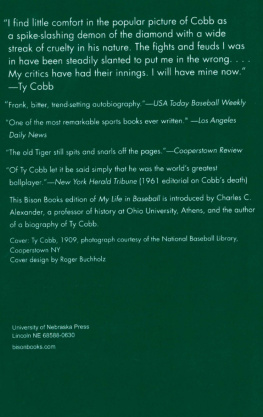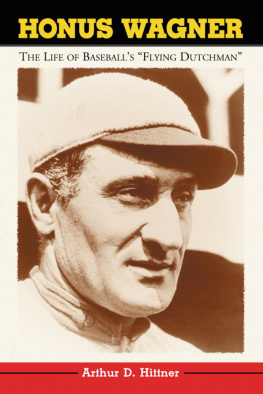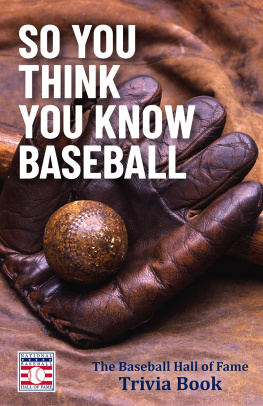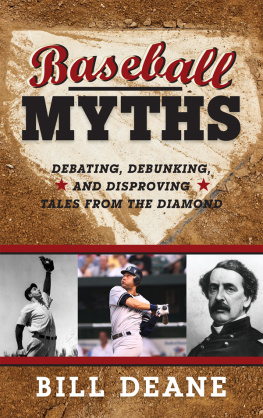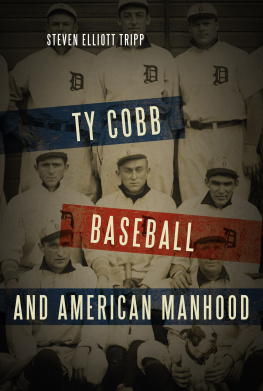Ty Cobb - My Life in Baseball: The True Record
Here you can read online Ty Cobb - My Life in Baseball: The True Record full text of the book (entire story) in english for free. Download pdf and epub, get meaning, cover and reviews about this ebook. year: 2014, publisher: Bison Books, genre: Non-fiction. Description of the work, (preface) as well as reviews are available. Best literature library LitArk.com created for fans of good reading and offers a wide selection of genres:
Romance novel
Science fiction
Adventure
Detective
Science
History
Home and family
Prose
Art
Politics
Computer
Non-fiction
Religion
Business
Children
Humor
Choose a favorite category and find really read worthwhile books. Enjoy immersion in the world of imagination, feel the emotions of the characters or learn something new for yourself, make an fascinating discovery.
- Book:My Life in Baseball: The True Record
- Author:
- Publisher:Bison Books
- Genre:
- Year:2014
- Rating:5 / 5
- Favourites:Add to favourites
- Your mark:
- 100
- 1
- 2
- 3
- 4
- 5
My Life in Baseball: The True Record: summary, description and annotation
We offer to read an annotation, description, summary or preface (depends on what the author of the book "My Life in Baseball: The True Record" wrote himself). If you haven't found the necessary information about the book — write in the comments, we will try to find it.
Highly successful in knitting together this story of the life of a most remarkable and dedicated playerperhaps the most spirited baseball player ever to have graced the diamond.Library Journal
Ty Cobb: author's other books
Who wrote My Life in Baseball: The True Record? Find out the surname, the name of the author of the book and a list of all author's works by series.
My Life in Baseball: The True Record — read online for free the complete book (whole text) full work
Below is the text of the book, divided by pages. System saving the place of the last page read, allows you to conveniently read the book "My Life in Baseball: The True Record" online for free, without having to search again every time where you left off. Put a bookmark, and you can go to the page where you finished reading at any time.
Font size:
Interval:
Bookmark:


Introduction to the Bison Book Edition copyright 1993 by the University of Nebraska Press
All rights reserved
Library of Congress Cataloging-in-Publication Data
Cobb, Ty, 18861961.
My Life in Baseball: the true record / by Ty Cobb, with AI Stump
p.cm.
Originally published: New York: Doubleday, 1961.
Bison.
ISBN-13: 978-0-8032-6359-8 (paper: alk. paper)
ISBN-13: 978-0-8032-6511-0 (electronic: e-pub)
ISBN-13: 978-0-8032-6512-7 (electronic: mobi)
I. Cobb, Ty, 18861961. 2. Baseball playersUnited StatesBiography. I. Stump, AI. II. Title.
GV 865c6A3 1993
796.357092dc20
[B]
92-35297 CIP
The publisher does not have any control over and does not assume any responsibility for author or third-party websites or their content
Introduction
by Charles C. Alexander
The greatness of Ty Cobb was something that had to be seen, and to see him was to remember him forever. That was the way George Sisler, the brilliant first baseman who rivaled Cobb for stardom in the early 1920s, once summed up his feelings about the man still frequently named as the greatest baseball player of all time. When Cobb quit playing at the end of the 1928 season, he held more than forty major-league or American League records for batting, base-stealing, runs batted in, runs scored, and numerous other offensive categories. Since the 1960s most of those records have been eclipsed, including his 4,191 career base-hits and 96 and 893 stolen bases for a season and a career, respectively. He remains the all-time leader in runs scored, and both his career batting average of .367 and twelve hitting titles in thirteen seasons are never likely to be equaled.
Yet far more than records, its the image of Cobbas not just a marvelously expert batter and base-runner but as a ruthless and often vicious competitor and a quarreling, brawling, single-minded lonerthat continues to fascinate students of baseballs long and rich history. As Cobb himself said, Baseball is a red-blooded sport for red-blooded men. Its no pink tea, and mollycoddles had better stay out. Its a struggle for supremacy, a survival of the fittest (see page 280).
Apart from his unsurpassed competitive drive, Cobbs ballplaying genius was a matter of intelligence. Although he had no more than ten or eleven years of formal schooling, he brought to baseball (and later to his business affairs as well) an extraordinarily quick, insightful grasp of immediate circumstances. As his longtime teammate Sam Crawford once remarked, He didnt outhit and he didnt outrun them. He outthought them! Elaborating on that theme, the folklorist Tristram Coffin has contrasted Babe Ruth as a prowess hero, in the mold of Beowulf or Hercules, with Cobb as a non-comic trickster. Whereas Ruths success depended on the elemental, heroic exertion of strength, Cobbs was a matter of guile, deception, and surprise. What Ruth achieved was simple and straightforward, but Cobb seemed a creature without normal motivation, a ballplayer .. who goes about his business oblivious to the laws and customs of the society in which he lives.
Born on December 18, 1886, Tyrus Raymond Cobb was the eldest of three children of William Herschel and Amanda Chitwood Cobb. He grew up in the little town of Royston in northeastern Georgia, which at various times his father served as its school principal, newspaper editor, mayor, county school superintendent, and state senator. An unquestioned pillar of the community and an imperious, demanding man, Cobbs father expected great things in traditional lines of endeavor from his son Tyrus, whose own interests ran contrarily to baseball.
In the spring of 1904, much against his fathers wishes, the seventeen-year-old Cobb left home to make a career for himself in professional baseball. Initially cut from the roster of the Augusta, Georgia, club in the South Atlantic League, Cobb later made himself into the circuits outstanding performer. Playing the outfield, throwing right-handed but batting from the left side, young Cobb made it to the top in August 1905, when the American Leagues Detroit Tigers purchased his contract for $700.
As he readied to leave for Detroit, Cobb received news of his fathers death. Cobbs mother, he subsequently learned, had mistaken her husband for a nighttime prowler and killed him with two shotgun blasts. While people in Royston whispered that W. H. Cobb had actually been trying to catch his wife with a lover (a suspicion that was never confirmed but became part of local legend), Amanda Chitwood Cobb was indicted for voluntary manslaughter and bound over for trial the following spring. Tyrus Cobb finally got into his first major-league game, at Detroits Bennett Park, on August 30, 1905. In that and thirty-nine other appearances over the remainder of the season, Ty (as he was quickly dubbed by local baseball writers) batted only .240 and proved undependable in the outfield.
The next spring, at Augusta, where the Tigers held their preseason practice, Cobb endured what he would later describe as the most miserable and humiliating experience Ive ever been through (page 20). His mothers legal troubles preyed on his thinking until she was acquitted late in March, but meanwhile the youth reacted violently to the razzing and hazing by veteran teammates that was customary for newcomers in that period. Naturally touchy and high-strung, a native Southerner and Baptist trying to relate to men who were mostly northern-born, Irish-American, and Roman Catholic, Cobb became enraged when the teams regulars shouldered him away from the plate during batting practice, locked him out of the hotel bathroom, and destroyed his favorite bats.
Ostracized and, as he saw it, persecuted by his teammates, Cobb, a mild-mannered Sunday school boy when he joined the Detroit club, became a self-described snarling wildcat. From then on, he went his own wayaloof, suspicious, without any real friends on that team or among the dozens of other men who would be his teammates over the next twenty-two years.
On the ballfield, Cobb performed with a fierce, reckless intensity, determined to prove himself to his peers and vindicate his familys name to the gossips back home in Georgia. Although he led the club in batting and solidified his standing as a big-leaguer, he remained so much at odds with the other players that he took to sleeping with a pistol in his Pullman berth on road trips. At the end of the 1906 season, he was sick at heart and disillusioned. Id dreamed of becoming part of the Detroit organization, and all Id known, so far, was jealousy and persecution (page 26).
The next spring, again at Augusta, Cobbs ongoing feud with his teammates climaxed with a bad beating at the hands of a brawny catcher. Fortunately for the struggling Detroit baseball organization, manager Hughey Jenningss efforts to trade the troublesome youngster came to naught, because in 1907 Ty Cobb emerged as baseballs most spectacular performer. He won his first batting title, also led the American League in basehits, runs batted in, and stolen bases, and sparked the Tigers to their first pennant.
Two more pennants followed in the next two seasons, and although the Tigers lost all three World Series, Detroit became one of the most profitable franchises in the majors. The single biggest reason for the Tigers successon the field and at the ticket windowswas the Georgia Peach, whose hell-bent style and frequent run-ins with opposing players, people in enemy cities, and sometimes even with hecklers in his own ballpark made him baseballs top gate attraction. Although he never played on a championship team after 1909, he gained general acclaim as the greatest the National Pastime had yet produced. By 1915, earning $20,000 per season, he was also its best paid.
Font size:
Interval:
Bookmark:
Similar books «My Life in Baseball: The True Record»
Look at similar books to My Life in Baseball: The True Record. We have selected literature similar in name and meaning in the hope of providing readers with more options to find new, interesting, not yet read works.
Discussion, reviews of the book My Life in Baseball: The True Record and just readers' own opinions. Leave your comments, write what you think about the work, its meaning or the main characters. Specify what exactly you liked and what you didn't like, and why you think so.

